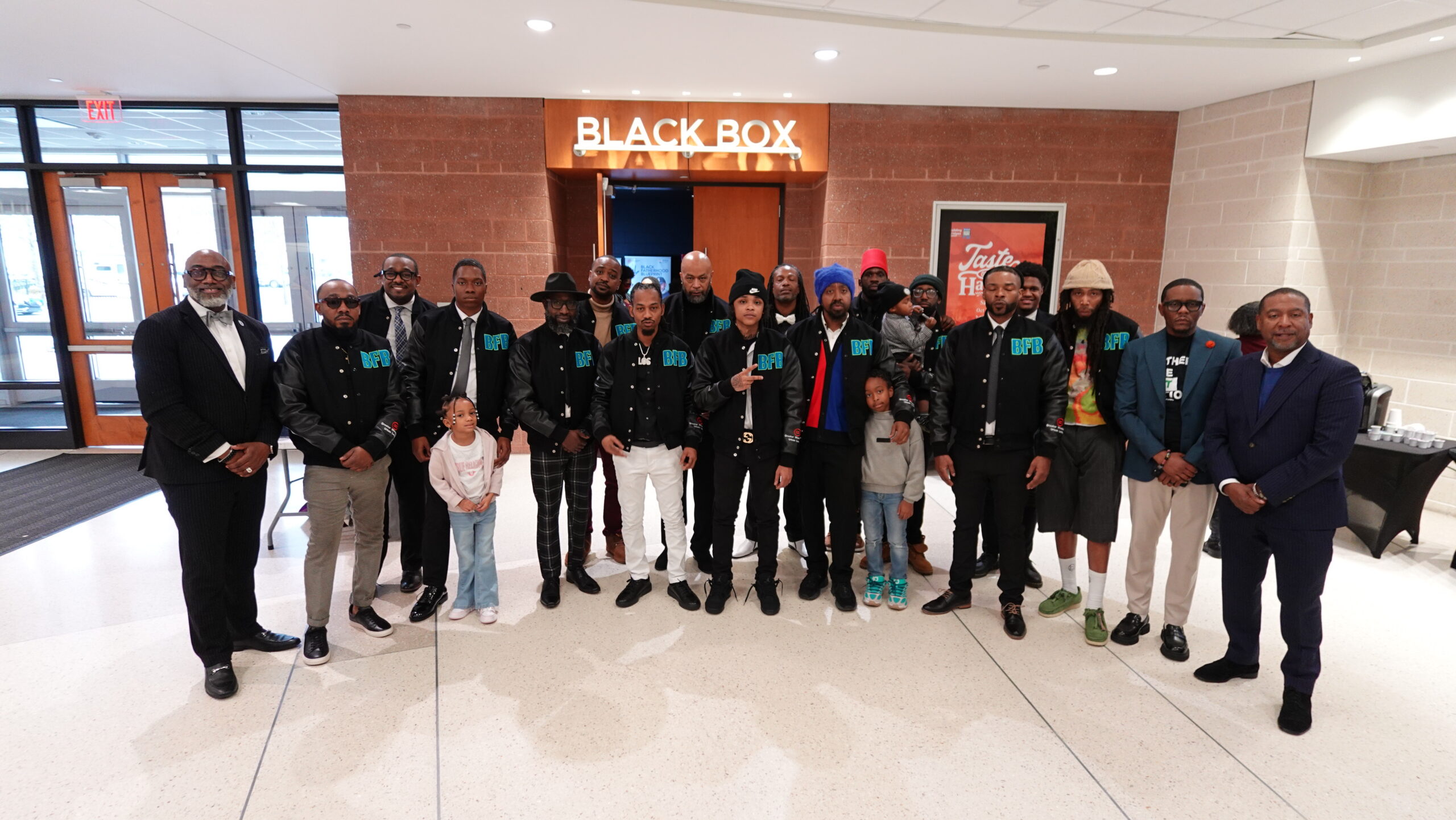Equity Definition: Understanding the Difference Between Equity and Equality
Oct 24, 2025
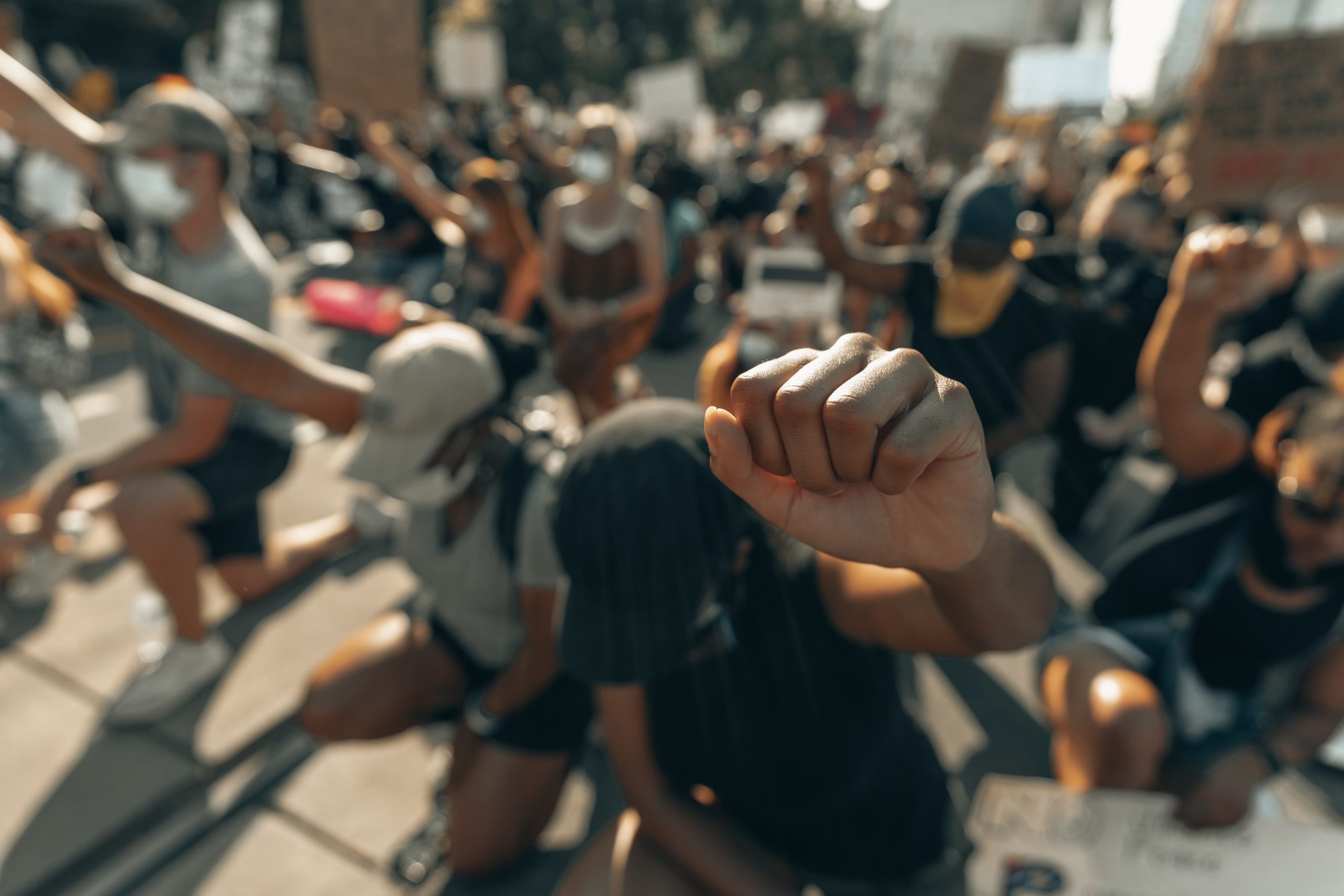
“Equity” and “equality” are not synonymous. Find out the difference between equity and equality and why United Way NCA is championing equity in the region.
Updated on 10/22/2024
Many people use “equity” and “equality” interchangeably when discussing important topics. It can be hard to see the difference between equity and equality, and many people assume they are synonymous. In both social justice and racial justice movements, the difference between equity and equality becomes clear as equity addresses individual needs for fair outcomes.
Equity, by definition, is the quality of being fair and impartial
Equality: the state of being equal, especially in status, rights and opportunities.
United Way of the National Capital Area champions equity for all, regardless of race, gender, income, ability or zip code. But what does equity mean, really? What does United Way NCA mean when we talk about reaching equity for all?
Below, we break down the difference between equity and equality, why the difference matters for marginalized people and how United Way NCA is creating a more equitable future for the National Capital Area. Then, see our impact and find out ways to give to support our mission.
What Is Equity? Definition and Examples
According to the equity definition, it involves meeting communities where they are and allocating resources and opportunities based on individual needs to create equal outcomes for all community members.
The Legal and Financial Definition of Equity
Equity, in legal terms, is defined as justice according to natural law, free from bias or favoritism. It originated in the English chancery and was developed to ensure fairness, supplementing or even overriding common law in cases where strict legal rules might lead to unjust outcomes. In finance, equity refers to the value of ownership in a property after subtracting debts, such as mortgages, and also represents common stock in a corporation.
What Is Equality? Definition and Examples
Equality means each individual or group of people is given the same resources and opportunities, regardless of their circumstances. In social and racial justice movements, equality can actually increase inequities in communities as not every group of people needs the same resources or opportunities allocated to them in order to thrive.
The Etymology and Historical Use of Equity
The term ‘equity’ originates from the Latin word ‘aequus,’ meaning ‘even’ or ‘fair.’ It was first used in the 14th century and has been a foundational concept in both legal and financial frameworks ever since. In legal contexts, equity law grew out of the English chancery system, where it was designed to remedy the shortcomings of rigid statute law, ensuring just outcomes.
Equity vs Equality: What’s the Difference?
The difference between equity and equality is that equity recognizes each person has different circumstances, meaning different resources must be allocated based on individual needs for all to thrive.
Equality, on the other hand, is giving everyone the exact same resources across the board, regardless of individual or groups of people’s actual needs or opportunities/resources already provided to them.
In equitable programs like United Way NCA’s work, instead of giving each individual or group of people the same resources (which aligns with the definition of equality), data is analyzed based on the equity definition to determine where funds, resources, and opportunities need to be allocated most, ensuring all community members have the same opportunity to thrive.
If you have researched the differences between equity and equality before, you have probably come across this helpful illustration of an apple tree created by Tony Ruth, with two children standing below it in hopes of receiving fallen fruit.In the “inequality” version of the illustration, it shows two boys standing under the tree. The tree is slightly slanted toward the left, and therefore the apples are falling all on the left side, to one boy. The boy on the right receives nothing. When they are both given a ladder of the same height (equality) the boy on the left gets even more apples than he did on the ground, but the boy on the right still receives none—his ladder is not tall enough to reach the tree. When the boy on the left is given a ladder of the exact height he needs to reach the tree, he receives more apples, and when the boy on the right receives a slightly taller ladder than the boy on the left (based on his individual needs), he too is able to finally reach the tree and collect apples.
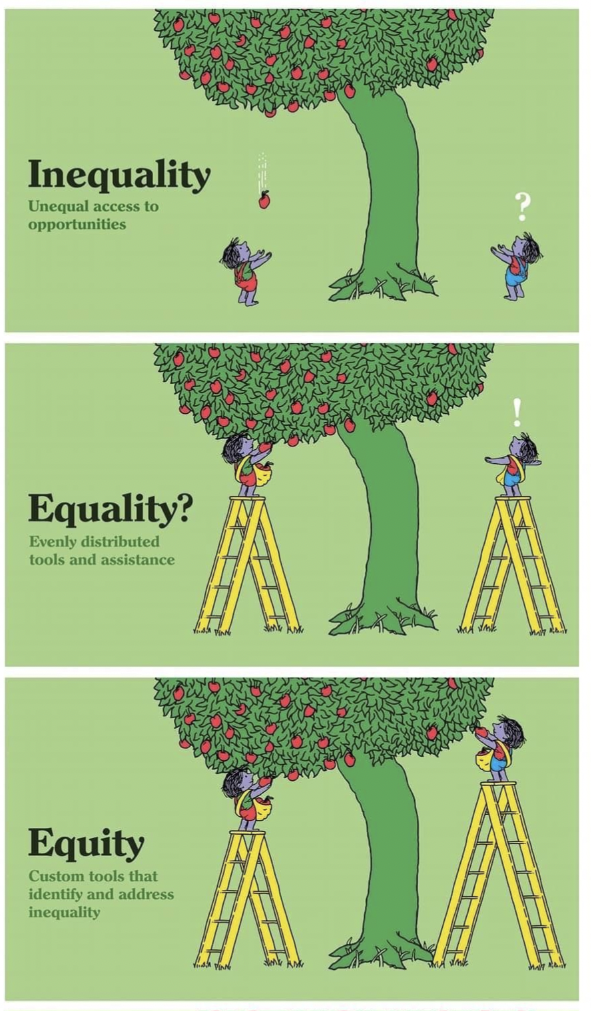
This example shows there is not a one-size-fits-all solution (equality) to the problems we see in the world, but there’s a right-size solution for each individual’s needs (equity).
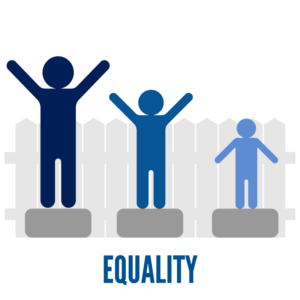
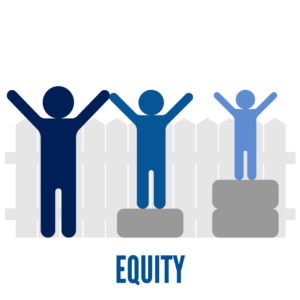
Equity vs Equality in Education and Employment
The difference between equity and equality is especially visible in education and employment. Equality might mean giving everyone the same tools, but equity involves recognizing individual needs and addressing them accordingly. In the workplace, Diversity, Equity, and Inclusion (DEI) initiatives often focus on equity by ensuring that underrepresented groups receive the mentorship, resources, and opportunities they need to succeed.
Equity and Justice
Practicing equity helps address imbalanced social systems. However, justice can take equity one step further by changing societal systems to align with the social justice definition and achieve sustainable and equitable access for future generations in the long term.
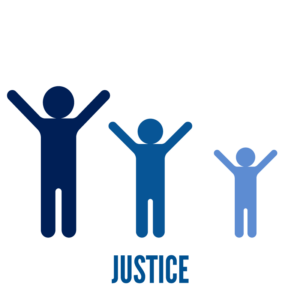
What are Examples of Equity?
- Leaders in the National Capital Area host an information meeting for all community members on the COVID-19 pandemic, testing, vaccinations, and more. Following the equity definition, they host this event multiple times in different languages, including English, Spanish, and Korean, to ensure all major populations receive the same information in their native or primary language.
- Low-income students in a Prince George’s County neighborhood do not have access to the internet or computers, making it difficult for them to complete lessons and homework assignments during their school’s virtual, at-home school year. In contrast, other students throughout the county have affordable access to Wi-Fi, laptops, and digital tools to succeed. Following the equity definition, a local nonprofit analyzes the data and allocates funds to supply the students without internet access with Wi-Fi hotspots and laptops, while not providing these resources to students who already have them. Now, all students have the tools they need to succeed in a virtual learning environment.
What are Examples of Equality?
Let’s look at the same situations we noted in the section above, but instead of finding equitable outcomes, we’ll describe what they would look like if equality had been the focus.
- Leaders in the National Capital Area host an information meeting for all community members on the COVID-19 pandemic, testing, vaccinations, and more. However, they only host the meeting once, and it is only held in the English language. This approach raises important questions about equity vs equality in public health communication. While treating everyone equally by offering one English-only session might seem fair, it ignores the needs of non-English-speaking residents, effectively isolating a large population from receiving potentially life-saving health information.
- Low-income students in a Prince George’s County neighborhood do not have access to the internet and don’t own computers, making it difficult for them to complete lessons and homework assignments during their school’s virtual, at-home school year throughout the pandemic. This situation highlights the difference between equality and equity in educational resources. While laptops were distributed equally to all students by a local nonprofit, the lack of Wi-Fi hotspots for students without internet access reveals that equal distribution does not necessarily mean equitable access. Without affordable internet, these students continue to face barriers to their education despite having laptops, demonstrating why an equitable approach would consider both devices and connectivity to ensure all students can succeed.
How is United Way NCA Improving Equity?
United Way of the National Capital Area believes everyone deserves hope, respect, and a fair chance. That’s why, following the equity definition, we’re creating a more equitable future for all community members by breaking down barriers in health, education, and economic opportunity. Understand our difference by reading our community impact stories, then learn more about our programs below.
United Way NCA reduces health disparities and improves health outcomes for individuals and families in the National Capital Area. Our health programs increase equity in access to health resources that promote physical and mental well-being among students and families. Find out how we’re doing this here.
We also reduce academic disparities and improve academic outcomes for young people in the National Capital Area by focusing on the education pipeline from middle school to college and/or career success. By working in Title I schools to address attendance, behavior, and course performance through our Community Schools program, United Way NCA emphasizes the importance of equity in education—recognizing that different students face unique challenges and therefore need tailored support to succeed. This approach goes beyond equality by ensuring resources and interventions meet students’ specific needs. Find out why United Way NCA focuses on middle school students and learn more about our programmatic work surrounding education here.
United Way NCA applies the equity economics definition by addressing wealth disparities and improving opportunities with targeted financial training and workforce development.
We do this by providing residents with economic opportunity and removing barriers to stable and affordable housing. Find out more details on our economic opportunity work here.
Equity Examples in Real Life
Equity manifests in various ways, from providing tailored educational resources to underprivileged students to ensuring that community services are available in multiple languages. These efforts ensure that people with different needs receive the support required to thrive. For example, United Way NCA allocates resources based on specific community needs to create equitable access to health, education, and economic opportunities.
How Can You Practice and Promote Equity in Your Community?
There are many ways you can practice and promote equity in your community, household, workplace, place of worship, etc. The first step is to reflect on your own belief system. What implicit biases do you hold? How can you dismantle those? How can you educate yourself through books, media, diversity and inclusion seminars, etc. to understand equity further?
One option is our 21 Day Race Equity Journey, a 21-day newsletter series focused around learning more about how equity plays a role in determining outcomes of people through different stages of life depending on their intersections of race, gender, sexuality and/or socioeconomic standing.
Or, check out our blog to keep up with topics regarding activism and opportunities around UWNCA.
To promote equity in your community, you need to get involved! Reaching an equitable future for all community members necessitates action. By supporting nonprofits and programs like United Way NCA, you can make a difference. This can be done through monetary donations, corporate sponsorships of programs, volunteering and advocating.
To learn more about the equity definition and how United Way NCA is achieving a more equitable future, visit unitedwaynca.org/equity and join the movement! From our signature events to our focus on households under the cost of living, we work to support our community throughout the DMV. When none are ignored, all will thrive.
FAQs:
What does it mean when someone says they have equity?
When someone says they have equity, they are referring to their ownership stake in an asset or company, representing the portion of the asset that they truly own after accounting for any liabilities, such as loans or mortgages. Equity can be found in various contexts:
- Homeownership: Equity is the difference between the market value of the home and the outstanding balance of the mortgage.
- Stocks: Equity refers to ownership shares in a company, representing a claim on part of the company’s assets and earnings.
- Business: Equity in a business refers to the owner’s claim after debts and liabilities are paid off, often calculated as total assets minus total liabilities.
What is equity?
At its core, equity represents ownership and the value associated with that ownership in a particular asset or entity. The most common forms of equity include:
- Home Equity: The value of a homeowner’s stake in their property, calculated by subtracting the mortgage owed from the home’s market value.
- Shareholder Equity: The ownership interest in a company, representing the residual value after all liabilities are accounted for. This includes stocks and is key for investors in evaluating a company’s financial health.
- Business Equity: The owner’s claim on a business’s assets after all debts have been paid.
About United Way of the National Capital Area
United Way of the National Capital Area improves the health, education, and economic opportunity of every person in the National Capital community, aligning with the equity definition to ensure resources are distributed based on individual needs. For more than 45 years, United Way NCA has been creating measurable impact across the District of Columbia, Northern Virginia, and Montgomery and Prince George’s counties. In 2020, United Way NCA was among 384 organizations across the United States to receive a generous transformational investment from novelist and venture philanthropist MacKenzie Scott. For more information about United Way of the National Capital Area and our work, visit to learn about us or go to unitedwaynca.org.
Recent Posts
blog



